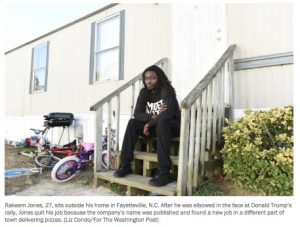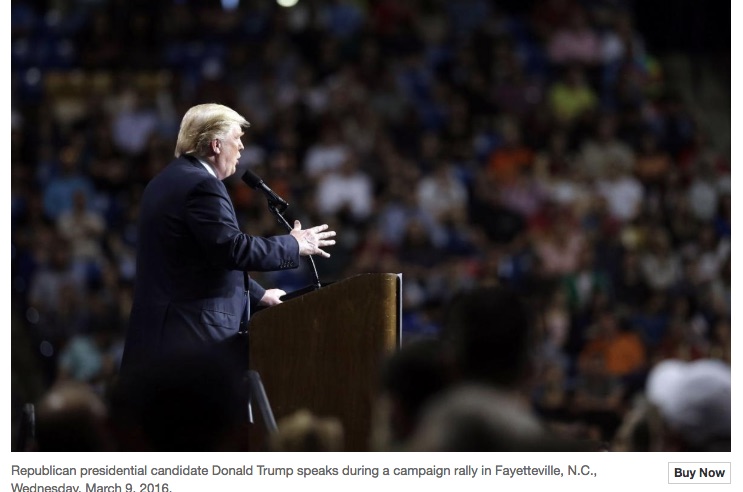DC Dave Martin (2017 Update)
In spite of everything they could do for her, their candidate has lost, so you might think that at this late date The Washington Post would give a rest to the story that came out of Fayetteville, North Carolina, last March. That is the one that did a lot to sell the American public on the notion that Donald Trump and his supporters were racists, but The Post would not leave ill enough alone. On the last day of 2016, apparently with the belief that fanning the flames of racial discord and vilifying white Southerners has no season, it let loose with what one would hope would be its last attempt to milk rancor out of the so-called “sucker-punch” incident entitled: “He was assaulted and called un-American at a Trump rally. Can he forgive the man who did it?”
In this little bit of overreach, though, the newspaper has inadvertently revealed how staged and orchestrated the Fayetteville incident really was. The heart of the new revelation is this passage in which the writer, Terrence McCoy, talks about the “victim” Rakeem Jones’s career path in the wake of his receiving that professional-wrestling-style phony punch:
- Working the counter, he makes $7.35 an hour. On deliveries, it goes down to $4.25 an hour, but there’s always the chance for a big tip, and he hustled the pizzas to a faded Mitsubishi sedan with a cracked windshield. He’d bought it earlier in 2016 for $1,600 — most of his savings — when McGraw’s attack at the Trump rally left him feeling unsafe riding the city bus. What if McGraw was serious about killing him? Considering the way the election had gone, what if a white-supremacist group decided to try something? Where he comes from, a rough neighborhood in northwest Fayetteville, threats are sometimes carried out. A few of his friends were murdered when he was younger, and two years before, someone shot up his aunt’s trailer, killing his 3-year-old cousin sleeping inside. So in the days after the rally, he quit his job after the company’s name was published, stopped taking the bus, bought a car and found a new job in a different part of town delivering pizzas.
Now I suppose that if you’re gullible enough, say, to contribute money to be propagandized by NPR you swallow this story whole, but to me it doesn’t even pass the laugh test. You’d think we were back during Reconstruction, in the days of the night-riding Ku Klux Klan. Was all that violence that had struck so close to the young Jones the work of white people motivated by racism? Get serious. People who still read The Washington Post and hang on every word of the MSM might buy it, but certainly Rakeem Jones and anyone else even remotely in touch with reality would wonder what the guy must be smoking to write such nonsense.
Rakeem Jones’s Payment
What McCoy has actually done here in his devious way is describe a rather sharp upturn in Jones’s fortunes in the wake of his performance at the Trump rally. McCoy would have us believe that Jones was forced to quit his good old job and take a miserable, low-paying new one out of fear that fanatic, fire-breathing white people might come after him at his old place of work. McCoy is very careful not to tell us what the old job was. For that we have to go back to The Post’s original breathless coverage of the episode, in which they describe Jones as a “26-year-old inventory associate.” That is to say, he was a stock clerk, which would have put him about as low on the retail pay scale as you can get. He apparently did not even own a car, relying, instead, on the bus to get to work, which likely would have been near his residence in a poor part of town.

Now, McCoy tells us that after his performance at the Trump rally, Jones “bought a car and found a new job in a different part of town delivering pizzas.” Beginning the paragraph by telling us that it pays below the mandated minimum wage at $4.25 an hour with just “the chance for a big tip,” McCoy manages to make this new job sound less desirable than Jones’s old one, which it is quite likely not, from an earnings standpoint. I know from experience. My oldest son delivered pizzas for Pizza Hut the summer after he graduated from high school and he made more at it than, I would think, the average liberal arts adjunct professor or small market TV reporter or even anchor makes. Where you are delivering makes all the difference between whether it is dangerous and low-paying (because the tips are low) or a very desirable job, indeed, about the best one a person with no education or skills can get in today’s economy. But you have to have a car.
So where is this other part of town in which Jones is plying his new trade? The following passage is both informative and dizzying with its spin:
He pulled into a gated complex, got out with the pizzas and saw a large red truck with plates that said: “Kill ’em all. Let God sort ’em out.”
“It’s Fayetteville,” he said. “That’s the mentality.”
Gated complex? He’s trucking pizzas in the absolutely richest part of the city. If he’s the least bit good at it he has to be doing very well, indeed. That’s where the big tips are. You almost have to think that someone got leaned on to give Jones that job, because there are a lot of people who would want it. But what about that truck and its bumper sticker?
Nowhere in McCoy’s long article does he tell us that Fayetteville is very nearly the ultimate military town. In fact, one wouldn’t be far off base to call it as much a federal city as Washington, DC. Fort Bragg, the home of the 82ndAirborne Division and the Special Forces, is there. It’s where I did my ROTC summer camp and where the Army Reserve artillery unit I was in later came close to inflicting heavy casualties on a National Guard outfit with a badly errant practice round (but that’s a story for another time). It is also the largest military base in the world, “with more than 50,000 active duty personnel,” according to Wikipedia. That bumper sticker slogan is a purely American military saying that I heard for the first time while on active duty in the Vietnam War era. So, yes, it might reflect a certain mentality around Fayetteville, though not one you’re likely to see on display in the typical gated community.
Rakeem Jones, the Philosopher
From a military saying, though, McCoy spins it into an occasion for the linguistically challenged Jones to wax philosophical about the current state of race relations, as we continue the Post quote:
There was a time when he thought differently, not just about Fayetteville but about America as well. He knew there were racists in his country and community, but he also trusted that its people were tolerant of diversity and wouldn’t vilify someone who went to a Trump rally and yelled out some words of protest. But since that night, he has thought about race constantly. He has thought about it when he has delivered pizzas to houses with Trump yard signs. He has thought about how he must look walking up to the door with his dreadlocks and tattoos, at times wondering whether he’d be welcomed if he weren’t holding a pizza.
Surely you must realize, dear reader, that this is The Washington Post and its shill, Terrence McCoy, speaking; it is not Rakeem Jones. Listening to Jones being interviewed by the oleaginous Lawrence O’Donnell one may readily conclude that words like “mentality” and “vilify” are not in Jones’s vocabulary, nor is it all likely that he is continuing to smart over any presumed “racist” treatment that he received at the Trump rally. Rather, what I see in the conciliatory behavior at the fake puncher John McGraw’s sentencing, on the part of both Jones and McGraw, is more a sense of guilt by both of them for any racial antagonism they might have stirred up in return for their easy money.

Money? Did I say money? Well, look at it. Ask yourself which scenario is more plausible, in light of what we learned from the Project Veritas videos. McCoy of The Post—which is virtually wearing its agenda on its sleeve—wants us to believe that this stock clerk had managed to accumulate more than $1,600 in savings, the lion’s share of which he used to purchase his used car after the incident at the Trump rally. We learn from Project Veritas, though, that, at least in one case, $1,500 was what a person was paid to be disruptive at a Trump rally in the hope that violence would be provoked. Is it not far more likely that the money for the car, necessary for the desirable pizza-delivery job, was payment for Jones’s performance at the Trump rally?
Ronnie C. Rouse
Now let’s skip ahead in the article for some more unintentionally revealing insights:
The sentence McGraw received was one year probation, and after the judge was done and the case was over, McGraw had one more thing to say to Jones. “We’ve got to stick together,” he quietly told Jones. “We can’t let them come between us.” Then he walked toward a side exit and put on his cowboy hat, and Jones went in another direction, toward a friend who had been with him the night of the rally.
“It was a slap in the face, man,” the friend, Ronnie Rouse, told Jones. “What messed me up here was the guy didn’t apologize.”
“Yeah,” Jones said and nodded his head. “Yeah.”
“If it was me? Ninety days, five-year probation, $1,000 fine. It’s crazy,” Rouse said, and a few minutes later, standing outside with Jones, he looked back at the courthouse. “He really believes in how he acted. He’s just a stubborn old man.”
“It’s real life,” Jones said. “What you see is what you get.”
There’s that extremely unlikely “friend,” Ronnie Rouse again, whipping up racial resentment just like he did in that interview with O’Donnell, but McCoy has him using street slang and Jones sounding like the thoughtful philosopher. Here is my transcription of the real Rouse responding to O’Donnell’s question, “Did you see anything like this coming?”
…We’re a very diverse, cultured city, and we watched a lot of these other events—this campaign that’s happening—in other cities in the Bible Belt in the South that are more racially charged areas historically, and we knew it wasn’t going to happen in Fayetteville, and we went to spectate and it happened to us in front of law enforcement and, it just, I felt like we took three steps back. It was the first time I was ever embarrassed to tell people I was from Fayetteville.
If McCoy of The Post was putting words in Jones’s mouth that really came from the far more articulate, but race-baiting Rouse, it was probably not the first time. This is from that first report of the incident:
Jones said he and four friends — a “diverse” group that included a white woman, a Muslim, and a gay man — had gone to the rally as a “social experiment.” He said the woman with them started shouting once Trump’s speech began.
“She shouted, but at the same time, they were shouting too,” Jones, a 26-year-old inventory associate, said. “Everyone was shouting, too. … No one in our group attempted to get physical.”
In this video, though, we hear Rouse using the term “social experiment” for what they were up to. It’s how he talks; it’s not how Jones talks, not any more than how he would use words like “diversity,” “mentality,” or “vilify.” Rouse is also thoroughly disingenuous in that brief interview, saying that they were “just going to go and watch,” but in the words that The Post attributed to Jones, they were admittedly being purposely disruptive. That is to say, they went to the rally with the intent of causing trouble, and they did. You can see it very clearly in the video as they stand up and shout obscenities as Trump begins to speak.
Some “social experiment!” How would the people in the audience know anything about the religious affiliation or the sexual orientation of the little group of disrupters? And why would this lowly stock clerk want to do anything like that? What could possibly motivate him and the others? Who put this odd collection of people together, anyway?
The Ringmaster
The fact that Ronnie Rouse has only a brief cameo role in McCoy’s long article and is treated as no more than a fellow meek, passive “victim” with Jones in O’Donnell’s appalling diatribe/interview should be telling. I have found that as a general rule it’s what the press ignores that’s most important. This is the same press, after all, that blacked out the news of the meager prison sentence given to America’s top alien smuggler, Stan Eury, just up the road from Fayetteville.
Listen to music producer/rapper Ronnie C. [Rouse] expound on his world view, first in rap style and then in prose, hereand you will see clearly that there is nothing meek or passive about this man, and that like the former boxer and friend of Sammy Davis, Jr., Air Force veteran and Old West fight re-enactor John McGraw, throwing his fake punch, Rouse is just putting on an act in that O’Donnell interview. The most telling line in his rap might well be “I got my tricks up my sleeve.”
Even more telling is Rouse’s rap “The Paper,” with its recurring refrain, “So I’m just chasing the paper.” I really don’t think that he means it ironically or he is talking about someone else here while using the first person. This is purely autobiographical. The Urban Dictionary defines “paper chase” as “hustling to get fast cash” and “chasing paper” as “A person who only goes after money.”
Do we really need to look much further for the ringmaster of that little circus act performed in Fayetteville last March? Jones and McGraw are two people who badly needed money, while Rouse could hardly show more openly how badly he craves it.
Alternatively you can believe that Jones and Rouse are just two black men who happen to be friends. You wouldn’t know it from the mainstream coverage but Rouse is a minor celebrity and a major wannabe on the rap music scene, and he has a very big presence on the Internet. He has 271 connections on Linked-In where he calls himself a “music architect,” and lists 10 music and entertainment related skills. He also lists French and Portuguese under “Languages.” You can watch his work here and see that as a music architect and video producer he’s not half bad, either. I’m sure he could more than do justice to my composition, “So What?” if he wanted to perform it on a video.
From the full wiki we learn that he is an Army brat through and through, with both his parents non-commissioned officers, now retired. He lived in Germany for three years during an important formative time in his life, starting at age five. “During that time,” we are told, “Ronnie became engrossed in books and computers, as well as the hip-hop movement…. It was a life changing time for Ronnie, because he was able to involve himself with families of diverse cultures and races in the military environment.” The family returned to a very rough Fayetteville neighborhood where he lived until he was 16, when they moved to the much nicer and safer College Lakes neighborhood.
He will be 34 years old this September, which would make him approximately seven years older than Rakeem Jones. Jones, by contrast, we gather, hasn’t yet come close to making it out of the city’s bad part of town. Noting their considerable age and experience differences and listening to each of them talk, it is inconceivable to me that they would have enough in common to be friends.
Rouse has 824 followers on Twitter, but very few people seem to be watching his videos on YouTube these days. Rapper and music producer Sean Combs seems to be the sort of person he aspires to be, but that doesn’t seem to be working out too well of late, so perhaps he saw this Fayetteville gig as a chance to take the Van Jones route to fame and fortune, as a race merchant. And, what do you know; there he is since the event contributing articles to the Huffington Post. He began his first effort, “What I Know about America after Being Thrown out of a Trump Rally” rather inauspiciously:
As I woke up this morning, the reality and depth of the situation started to finally set in.
Seventy-plus interviews later, my childhood friend and I are on national news because we decided to attend a presidential campaign event. My childhood friend and I are on national news because we were exercising our civic rights as Americans.
Well, that pretty well seals it, doesn’t it? Rouse wants us to believe that he and Jones are buddies because they are childhood friends, with a seven-year age difference. Do we really need any more evidence that the event in Fayetteville, which got saturation news coverage and went a long way toward painting Trump and his supporters as anti-black racists, was a paid operation? He even says it twice like he’s trying to convince himself, “My childhood friend.” Yeah, that’s the ticket.
More Stagecraft on Display
That is not to say that there is not more evidence that the whole thing was staged. Look at this early report from The Washington Post:
A Donald Trump supporter has been charged with assault after multiple videos showed him sucker-punching a protester at a campaign rally in Fayetteville, N.C. (emphasis added)
The videos, which appeared on social media early Thursday and are shot from different perspectives, show an African American with long hair wearing a white T-shirt leaving Trump’s Wednesday-night rally as the audience boos. He is being led out by men in uniforms that read “Sheriff’s Office.” The man extends a middle finger to the audience on his way out. (emphasis added)
What’s with the all those videos that just popped up on social media? One can’t help but think that a number of other people were paid to make sure that the little melodrama was captured for maximum exposure. If a Trump supporter or two happened to raise his phone to film the disrupters being led out, it doesn’t figure that he would rush out and put it on the Internet, because it makes Trump supporters look bad. Someone even made a video of McGraw playing the role of Trump partisan before the event began, haranguing protestors carrying signs.
As you might expect, not everyone reading McCoy’s production for The Post would have approached it as critically as I. Take, for instance, one Susan Phillips, who wrote the following just 13 days ago:
I’ve been very moved, as others have, by the Washington Post story about Mr. Jones and his grace and superhuman ability for forgiveness. Few of us could do that given the circumstances. He is a true hero and I hope a symbol of the healing and outreach that must occur in these times of divisiveness, hate, and fear that Trump has fomented.
And, bless her bleeding heart, she put her money where her mouth was (assuming this is not just some phony pump primer) and sent $250 intended for the “Relocation of Rakeem Jones.” Yes, just six days after the event in Fayetteville, Rouse opened a Go Fund Me campaign “on behalf of Rakeem Jones,” which gives $25,000 as its goal for the stated purpose of moving Jones to a different place from where he is currently.
Perhaps I just don’t know how to use the site, but I can’t find anywhere any answers to simple questions like Why? Where? or How? Maybe the Susan Phillipses of the world think it’s all self-explanatory. They’re going to take him out of that horrid, intolerant South and relocate him to some safer promised land in the North like, say, Baltimore or Chicago. Perhaps we’re supposed to take it like McCoy’s explanation for why Jones was forced to change jobs, because the bad old white people had found out where he worked. Maybe they’ve found out where he lives, too, so he has to change his address.
If Rouse had come right out and said that Jones needed to move to be closer to his new, more desirable, place of work, I could believe it, although I still wouldn’t have much trouble resisting the urge to send money to the custodian of the fund. Rouse’s rap line, “So I’m just chasing the paper,” made too big an impression on me, I’m afraid.
David Martin
January 19, 2017



